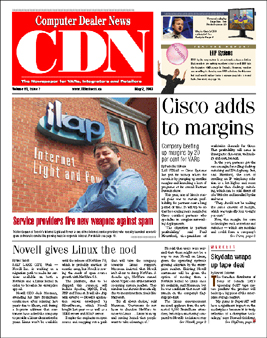|
Howard Solomon
Computer Dealer News 
When Toronto telecommunications
consultant
Eamon Hoey retrieved his e-mail after a recent two-day holiday,
he was stunned to find the inbox was jammed. Not with business,
but with spam. So much, in fact, his provider had to bounce
some messages back to the senders.
"I was overwhelmed," he says.
It's not a new story. But because spam
creates a drain on bandwidth — as well as unhappy customers
— some Internet service providers are finding new weapons
to slam spam and keep corporate customers happy.
Internet Light and Power (ILAP), for
example, a Toronto service provider with about 3,000 corporate
clients, recently launched its internally developed iPermitMail
software, which, for $69.95 a year, lets a user create a so-called
"whitelist" of e-mail addresses that mail can be
received from.
Pathway Communications, a Toronto ISP
with about 1,000 corporate customers, has taken a different
approach: selling it's own network management and monitoring
software for other service providers and enterprises, which
includes spam-blocking technology.
Both created solutions after years of
trying other products. ILAP, which also offers services such
as database and Web site development, tried software that
creates blacklists of senders and forbidden words. "But
you're forever trying to stop the world from coming to you,"
said Tristan Goguen, the company's president.
ILAP's iPermitMail tries to reverse that.
Mail from unapproved senders is held in a folder for deletion
or acceptance. The system also lets users "inherit"
the approved lists of other iPermitMail customers, which ILAP
hopes will lower the number of legitimate addresses that need
to be added to each person's list.
Goguen says the system blocks spam "99.999
per cent of the time."
Pathway's NetPulse was originally built
by the company to help monitor its network, but then developed
into a product for sale.
According to Stephen Novotny, Pathway's
manager of information technology, it includes three anti-spam
features: an updated list of known offending mail servers
and text filters, both of which are set by network administrators,
and personal address filters, which can be set by each user
similar to ILAP's system.
NetPulse carries a list price for ISPs
of $20,000, for enterprises it costs $12,500.
Multiple weapons are the best defence
against spam, says Maurene Caplan Grey, research director
for e-mail at Gartner Inc. "Whitelisting is good, but
by itself has limited usefulness."
But teaching staff safe e-mail practices
is also a vital anti-spam weapon, she says. Don't reply to
spam, don't use business e-mail addresses in online chat or
user groups, she adds.
Meanwhile, major vendors continue to
release spam-fighting products for enterprises. Last month,
Network Associates put out McAfee SpamKiller for Microsoft
Exchange 2000 Small Business, which uses blacklists, whitelists
and content filtering.
Microsoft announced its upcoming Exchange
Server 2003 will include a tool so partners can integrate
anti-spam solutions to scan an e-mail message and score its
probability of being spam.
|